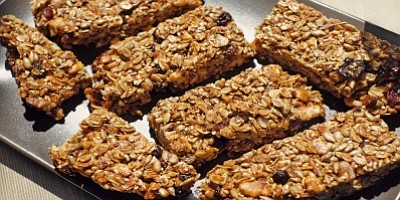Energy bars are a convenient source of nutrition and come in a wide variety of flavors to satisfy different palates. They are often fortified with vitamins and minerals, which can help fill nutritional gaps.
But, like many foods in a specific category, not all energy bars are created equal. Those that are low in saturated fat and sugars, with a decent amount of protein and fiber, can provide a nutritious, satisfying pick-me-up. Others can closely mimic a candy bar. For example, some bars covered in chocolate contain as much saturated fat as a Snickers bar; others contain almost as much sugar.
Energy bars containing mostly fruit and nuts can serve as satisfying snacks. But if you’re looking for a meal replacement, aim for a bar with a higher amount of protein: about 10 to 20 grams. Athletes can also benefit from choosing a bar with more protein and carbohydrates, as their needs are higher.
You can afford more calories if bars are consumed in place of meals and not as snacks. But if a bar is intended only to tide you over until dinner, limit it to 150 to 200 calories.
In general, try to aim for bars with less than 3 grams of saturated fat and at least 4 grams of fiber. Palm kernel oil in yogurt and chocolate coatings will boost saturated fat. Also watch out for bars with ingredients such as brown rice syrup or cane invert syrup listed first, as they are generally higher in sugars than others and are better suited for athletes, not weight watchers.
Note that some bars contain sugar alcohols such as maltitol or erythritol, to lower the sugar content. Because they are not fully absorbed, sugar alcohols provide fewer calories than sugar — but they can also cause some gastrointestinal distress.
One last point: Don’t be fooled by the word “energy.” In the nutrition world, energy is synonymous with “calories,” and all food gives you energy because it provides calories. There’s nothing magical about energy bars in and of themselves, and they won’t give a boost in strength or focus unless you’ve been skipping meals and snacks.
Additionally, energy bars shouldn’t take the place of whole foods, especially fruits, vegetables, whole grains and nuts, which provide a package of beneficial nutrients that are important not only for energy but for overall health.
So stock up on a stash of healthful energy bars to keep in your bag or at your desk and enjoy them on days that don’t allow for a break to sit and eat. Just don’t make them the main staple of your diet.
Seven energy bars that meet the above recommendations:
SimplyProtein’s Maple Pecan protein bar: 150 calories; 5g fat; 0.5g sat fat; 16g protein; 7g fiber; 1g sugar
PowerBar’s Plant Protein snack bar: 230 calories, 2.5g sat fat, 10g protein, 8g fiber, 10g sugars
Kind Snacks’ Cranberry Almond + Antioxidants with Macadamia Nuts bar: 190 calories, 13g fat, 1.5g sat fat, 4g protein, 5g fiber, 8g sugar
Luna Whole Nutrition Bars’ Chocolate Peppermint Stick: 190 calories, 2.5g sat fat, 8g protein, 4g fiber, 8g sugar
Kashi’s GoLean Plant-Powered Dark Chocolate Cashew Chia bar: 200 calories, 2g sat fat, 8g protein, 4g fiber, 8g sugars
Lärabar’s Apple Pie: 190 calories, 1g sat fat, 4g protein, 5g fiber, 18g sugar
Pure Protein Plus’ Apple Pie bar: 190 calories, 1.5g sat fat, 20g protein, 16g fiber, 3g sugar (2g sugar alcohols)
